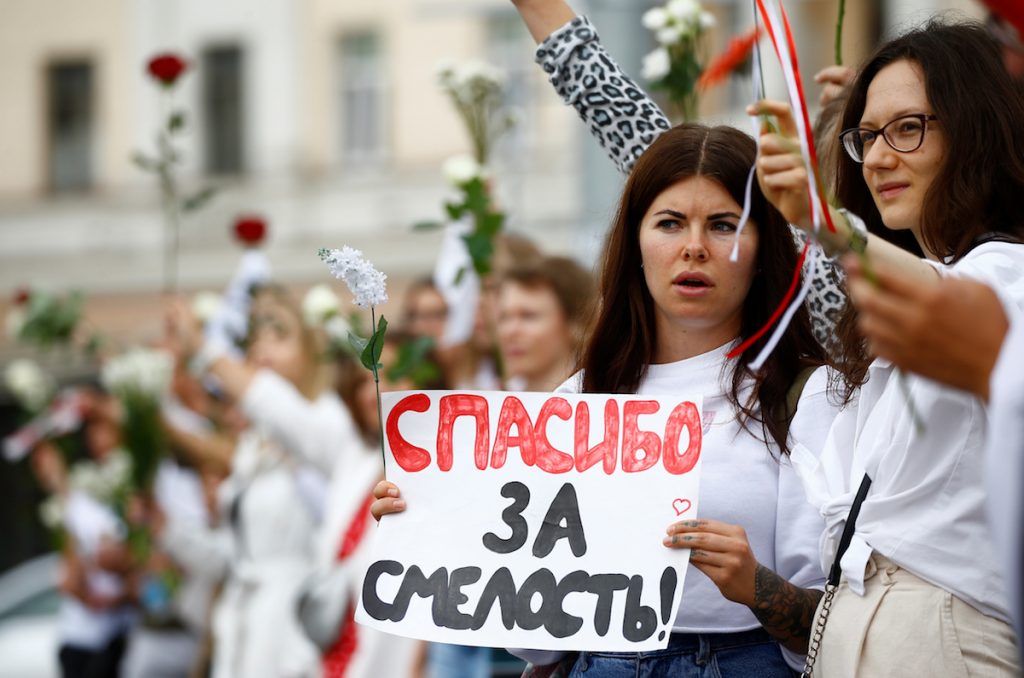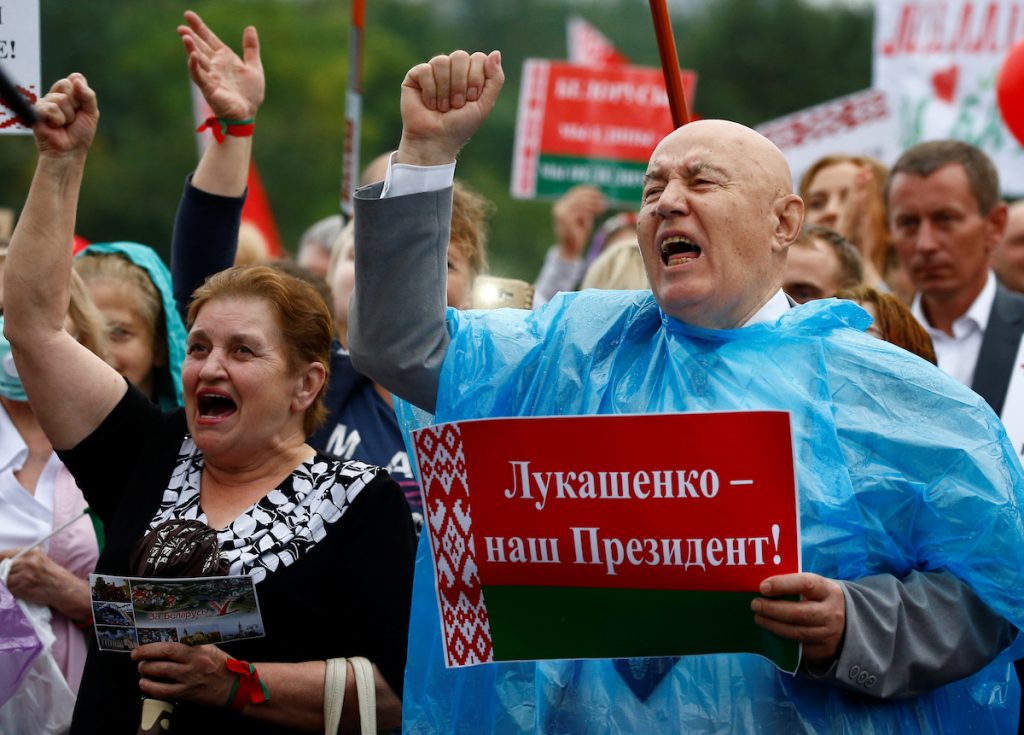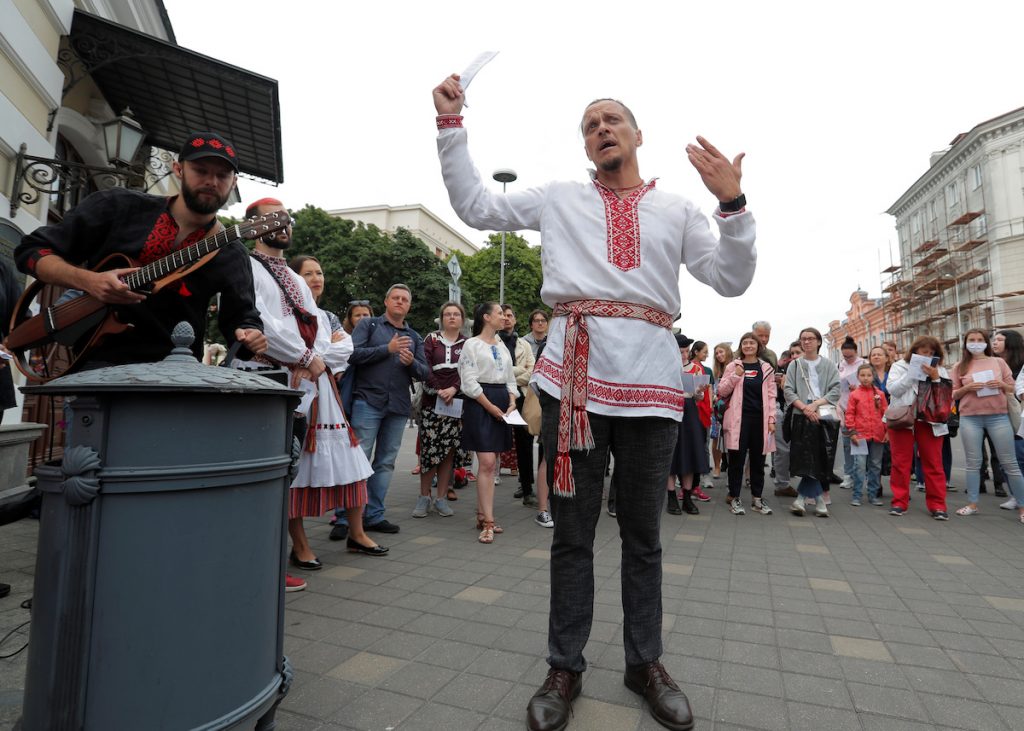Who will come out on top in Belarus – the opposition or the authorities? Analysis
The disorganized nature of the protest in Belarus is starting to work against its participants. Europe meanwhile has offered to step in and mediate, to support a democratic Belarus but also help it maintain ties with Russia.
In Belarus, which has been overwhelmed by protests for almost two weeks, a light at the end of the tunnel my be starting to appear.
The European Union has offered to mediate in the negotiation process between the authorities and the opposition in Belarus, and offered to involve the OSCE in the process as well. The initiative was supported by Russian President Putin, and President of Belarus Lukashenko “reluctantly agreed” to it.
This was announced on the evening of August 20 by French President Emmanuel Macron at a joint press conference with German Chancellor Angela Merkel.
The situation in Belarus changes every day. And before the possible start of the negotiation process, the main question is what other opportunities the parties have: Lukashenko, who is tacitly supported by the Kremlin, and the protesters, whom the West openly sympathizes with.
Brief chronicle of events
At first, the security forces brutally suppressed thousands of demonstrators protesting election fraud.
Then, the special forces’ aggression suddenly stopped, several thousand detained protesters were released. The protest turned into a peaceful form and reached an unprecedented scale – at least 400,000 participated in the rally in Minsk on August 19.
The protests have no obvious leaders; in fact, the Nexta telegram channel acts in this role. With its coordination, a large-scale workers’ strike began in the country.
Since 19 August, however, Lukashenka has gone on the offensive again – rallies in his support are being organized throughout the country, new threats have poured towards the protesters, and new criminal cases have been opened.
• Strikes, support from Europe and the threat of Russian intervention: the situation in Belarus
• Belarus protests fueled by Telegram channel Nexta – what is it, how does it work?
• Belarus: horrific evidence of torture and beating of protesters, general strike begins
Indistinct protest
People in Belarus continue to protest. In Minsk and other cities, rallies of 20-100,000 people gather every day. People are standing in a chain of solidarity, especially at women rallies.
Nexta has called on the public on August 23 to participate in the “March for a New Belarus” with the same requirements as before:
– freedom for detainees and political prisoners,
– Lukashenka’s departure,
– for those guilty of murder and torture to be brought to justice.
However, almost two weeks after the start of the protest, none of the protesters’ demands have been met.

Western countries have not recognized the victory of incumbent Alexander Lukashenka in the presidential elections in Belarus on August 9 – but they are in no hurry to officially recognize the opposition candidate Svetlana Tsikhanouskaya as president.
Recognition of Tsikhanouskaya by the president is not among the demands of the protesters – although initially she declared herself the winner of the elections.
There are no politicians in the Coordination Council, created on the initiative of Tsikhanoiskaya to transfer power. Instead of them, there are representatives of labor collectives in factories and famous writer, Nobel laureate in literature Svetlana Aleksievich, an Olympic champion, journalists, businessmen and scientists.
Perhaps that is why, say many analysts, the Coordination Council has so far failed to propose either a coherent programme of change, or even a strategy for the protests.
The only thing that so far has been heard from the council is that its members advocate “transparent, friendly relations with Russia” and “pragmatic work and partnership with all countries.”
This situation can change, apparently, only in the case of further development of the protest, especially the workers’ strike.
This is mentioned in all Nexta videos, but although the protests were supported by workers across the country, not all enterprises have gone on strike.
In order to support people who have lost their income due to participation in the protests, a Solidarity Fund operates in Belarus, which has already raised over a million dollars. The National Strike Committee was created, which turned to the Belarusian business for support.
Lukashenka: jail activists, defend against NATO and integrate with Russia
Lukashenka has so far stated that he is not going to enter into dialogue and make any concessions.
He continues to insist that the situation in Belarus is provoked by hostile elements controlled from abroad and instructs the law enforcement agencies to “protect working collectives from threats”, monitor the movement of NATO troops and identify channels for financing the opposition.
The Coordinating Council, according to Lukashenka, includes “those who were once were in power, and … Nazis.”
General Prosecutor Alexander Konyuk stated that “the creation and activities of the Coordination Council are aimed at seizing state power.”
Words about the “Western threat” are accompanied by flirting with a rather large pro-Russian part of society and with Russia itself.
Lukashenka says that the opposition allegedly plans to withdraw from integration projects with Russia, close Russian military bases and ban the Russian language.
All of this is said by a man who for months insulted the Russian authorities, accusing them of interference in the elections, including an attempt at military intervention.
The city streets, previously painted in red and white, the colors of Lukashenka’s opponents, are also filled with state red and green flags, as rallies in support of the authorities are being organized everywhere.

There is a lot of evidence that people from different regions are brought to them in an organized manner, threatening to be fired or deprived of their bonuses.
Telegram channel Pul pervogo, which is linked to Lukashenka’s press secretary Natalya Eismont, has published a set of stickers in red and green colors. Among them are not only slogans of support for Lukashenka, but also pictures that are grossly offensive towards the protesters.
What could be next and what Europe and Russia can do
The European Union did not recognize the elections and promised personal sanctions against everyone who participated in fraud and violence, including Lukashenka himself.
But further support for the Belarusian protests has not yet appeared.
Latvia has already announced that it is not ready to recognize Svetlana Tsikhanouskaya as president.
The European Union is going to allocate 53 million euros to support civil society and people affected by repression – but does not plan to support the workers’ strike.
Russia continues to demonstrate a stance of strict non-interference and criticizes Europe for not remaining on the sidelines.
But many say this position is for show only. Many say the contingent of Russian military bases has significantly increased in Belarus.

Experts suggest there is an agreement that Lukashenka will increase Russian influence in the country in exchange for Moscow’s help in quelling the protests.
Lukashenka can hope to ease the protest. It is difficult for people to go out every day for weeks or months. Workers who have lost their wages will sooner or later end the strike.
Despite the opposition’s appeals to the security officials, they mostly remain loyal to Lukashenka.
Belarusian analyst Valery Karbalevich believes that “the authorities saw the weakness of the protest movement. It did not grow, it was not possible to declare a general strike. And it is logical that Lukashenka launched a counteroffensive.”
Belarusian political commentator Alexander Klaskouski says that the decisive factor in the situation is that the West does not have strong leverage over Lukashenka, and Putin actually supports him.
“Lukashenka is determined not at all to leave, and not even to seek a compromise, but to suppress those who disagree, even if there are millions of them. Belarus runs the risk of finally becoming a police state,” writes Klaskouski.
Analyst Nikolai Burov believes Lukashenka will be able to remain in power until September-October 2020 – “before the economic crisis begins to accelerate.”
Most likely, he says, “Belarus will face yet another clashes between the security forces and the people, followed by the collapse of the state administration system”.
Former Prime Minister and Foreign Minister of Sweden Carl Bildt noted that Armenia could be the best model for the transit of power in Belarus.
In his opinion, the West needs to take an active position and support a democratic Belarus – but help it maintain ties with Russia.


















